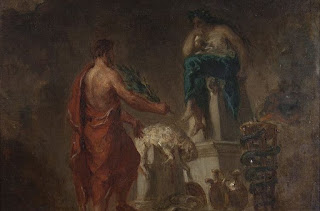In a time and place that offered few career opportunities
for women the role of a priestess at the oracle of Delphi was enormously
influential. The priestess Pythia was asked about everything, from warfare to love to public policy. Her position
was the peak of the most powerful religious institutions of ancient
Greece. The competitive city-states had
few authorities, political or otherwise, so her voice should not be
underestimated.
Indeed, there is some evidence to suggest that Pythia was
more than what we call today “knowledge economy”. Her role may have involved the gathering,
repackaging, and distribution of information with the intent of providing proper advice on the trivial and not-so-trivial questions of life in ancient Greece.
“Pythia” is the official position-title known of several women by
name who, during the long history of this institution (from ca 800 BC to 390
AD) held that role including Phemone and Aristoniki. Indeed, at some stage, Delphi became so busy
that 3 Pythias were appointed to serve the role simultaneously.
The oracle was consulted by influential people of ancient Greece with a diverse range of problems. This meant the opportunity to comment on many
issues of public and individual concern: cult matters, warfare, the
relationships between city-states, and the foundation of new ones.
Many personal questions were also put to the oracle on
matters of lovesickness, careers, childbirth and how to get offspring at the
right time. So by all standards, this job
was demanding yet also rewarding, a position powerful enough to change the course of history.
From the very beginning, efforts to deprive Pythia of her power prevailed, particularly in older classical times. Surely a woman, especially in a paternalistic society as ancient Greece, could hold this very powerful position.
Some scholars suggested that Pythia actually talked
unintelligible gibberish and her words were later put into beautiful and
meaningful hexameter verse by male priests.
Yet, according to ancient sources, there is nothing to
suggest that it was any other than Pythia herself who came with responses to
the country: She is named as the one and only source of the prophecies
delivered at Delphi.
The position of Pythia seemed to have angered those in power
in Sparta and Megara and other city-states in ancient Greece.
Who became Pythia? Unfortunately, ancient sources are vague. The Nobel prize-winning author, William Golden in his famous book “The
Double Tongue”, written about Pythia sees her as a local girl, unable
to get married took on the role.
The kind of skills required to be successful in the role were
easy to reconstruct. The sanctuary of Delphi served as a marketplace of
representatives from all over Greece who came for the oracle and various other reasons.
In addition to the oracle, Delphi housed regular athletic
competitions, the Pythian Games which were analogous to the famous Olympic Games. With its
numerous temples and monuments, the site was a popular tourist destination.
So perhaps the key to Pythian success was simply to listen
carefully. The most frequently asked
questions were: “Shall we win?” “Shall I marry?” “Is it the right time to
sail?” “Should I take up farming?”
In this case, it would have been possible to find the information necessary to answer any particular inquiry from the conversations of those queuing to consult the oracle, to watch or participate in the games or visit the monuments. Pythia must have truly erupted the knowledge of economy millennia before the arrival of “big data” and the invention of the Internet.
PLEASE DO NOT FORGET TO BE INOCULATED AGAINST COVID-19 TO SAVE YOUR BELOVED FAMILIES, THE WORLD, AND YOURSELVES SAFE AND HEALTHY


No comments:
Post a Comment